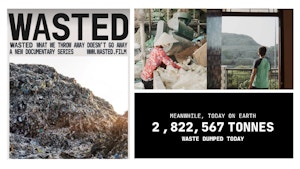Air Berita

Karbon & Iklim
Seeing mangroves regrow: A visual story on the surprise resurgence of Iloilo’s coastal forests
On International Day for the Conservation of the Mangrove Ecosystem, Eco-Business looks at the unexpected rapid growth of a thriving mangrove forest in Iloilo City, Philippines, following the completion of a man-made floodway.

Indian regulatory codes are largely advisory when it comes to dealing with heat, ignoring humidity altogether, placing millions in danger during heatwaves and monsoons.

As floods become more frequent, Bangladesh boosts warning systems and aid delivery but more needs to be done to mitigate risk.

Evicted local people say marine protected area around Indian Ocean archipelago is a colonial imposition.
Pangan & Agrikultur
Seafood farming surpasses wild catch for the first time: FAO
Kebijakan & Keuangan
Are China’s blue carbon credits a free pass to harm its oceans?
Air Opini

Funders put billions into the ‘blue economy’ but are ignoring its core principles of equity and sustainability, says Essam Yassin Mohammed.

Pangan & Agrikultur
Vietnam’s rice land restrictions: Time for a rethink?
There is a case for relaxing Vietnam’s long-standing restrictions on the use of land meant for rice cultivation.

Karbon & Iklim
Habitat destruction hurting more than climate change
Habitat destruction and modification harms biodiversity, and compounds the impacts of climate change and other threats to wildlife.

Pangan & Agrikultur
Can alternative proteins protect the ocean from overfishing?
As the sea is emptied of life to feed a growing human population, innovation in protein sources holds promise in diverting seafood production away from the ocean.
Karbon & Iklim
Strengthening Asia's voice for sustainable development
Pangan & Agrikultur
Fertilisers will not fix Africa's food crisis
Air Video

Launched as policymakers lock horns with petrochemicals lobbyists over a treaty to end plastic pollution, the documentary produced by Eco-Business asks why opportunities to solve humanity's waste crisis are being wasted. It will premiere in Singapore and screen on the sidelines of the upcoming COP28 climate summit.

Sampah
Fruit peels to the rescue
Watch: Singapore researchers are trying to give banana skins and coconut husks a new lease of life in water purification kits that can be used in disaster situations. They could one day also be used in the manufacture of batteries.

Do children ask the toughest questions? This World Oceans Day, we get renowned oceanographer Dr Sylvia Earle, founder of Mission Blue, to field questions from curious kids on the mysteries of the deep.

Karbon & Iklim
Dr Sylvia Earle: Why are we waging war on nature?
Eksklusif
In this exclusive interview to mark Earth Day, Eco-Business speaks to Dr Sylvia Earle, oceanographer and founder of Mission Blue, who draws the link between our climate crisis and the health of our oceans.
Air Podcasts

Karbon & Iklim
‘A 1.1°C warmer world is already a matter of life and death’: Climate scientist Winston Chow
The Singapore scientist, recently elected to the UN's top climate body, tells the Eco-Business Podcast about the precarious state of climate adaptation in developing Asia. The region is not well-prepared to manage the cascading risks of extreme climate events, he says.

Pangan & Agrikultur
Food crisis: how to build resilient supply chains in Asia
Studio EB
Dexter Huerto Jr of engineering firm Danfoss tells the Eco-Business Podcast how food supply chains have been affected by a pandemic and conflict, and how they can be fixed.

Studio EB
The built environment's sprawling carbon footprint can be reined in by giving old buildings a 'climate makeover' as cities grow. The Eco-Business Podcast talks to Vinod Jethani about the benefits and challenges of retrofitting old buildings.

Eksklusif
Oceanographer Dr Sylvia Earle speaks to Eco-Business in this exclusive podcast about the irreversible damage deep sea mining will cause, the link between the oceans and our global climate, and the role that we can all play in 'being at peace' with nature.
Air Rilis Pers

UN Environment Programme (UNEP)
Global Fund for Coral Reefs approves more than US$25 million in additional funding for resilience action

Singapore International Foundation
Singapore International Foundation launches first collaborative platform in Southeast Asia focusing on water-related climate adaptation

United Nations Development Programme
US$135-million UNDP, GEF initiative will support small island developing states tackle drivers of environmental degradation

UN Environment Programme (UNEP)
Record-breaking World Environment Day spotlights land restoration, desertification and drought resilience

Asean Centre for Biodiversity
Asean, UNDP launch marine conservation project
Air Riset

Eco-Business & Regional Project Energy Security and Climate Change Asia-Pacific of the KAS
Ocean of Solutions: Protecting biodiversity in the blue economy

SolAbility Sustainable Intelligence
The Global Sustainable Competitiveness Report 2020

Singapore International Water Week
SIWW 2018 Blue Paper: What will drive the next era of water management?

BirdLife International
State of the World's Birds 2018—taking the pulse of the planet













